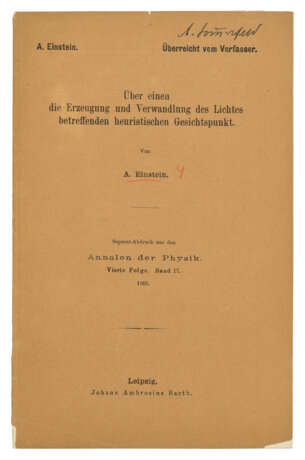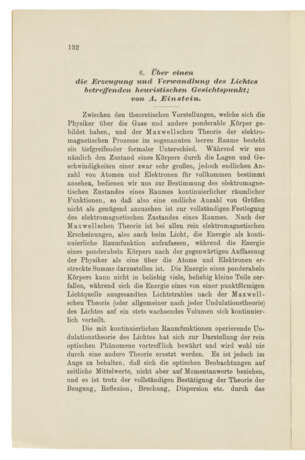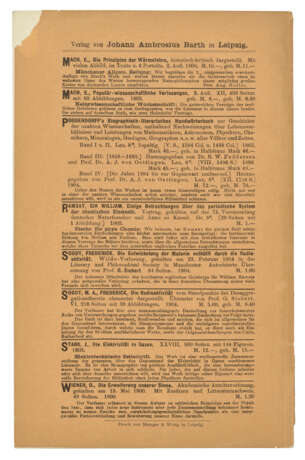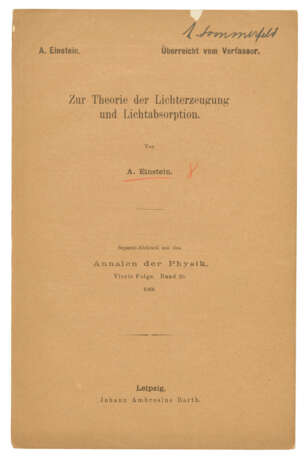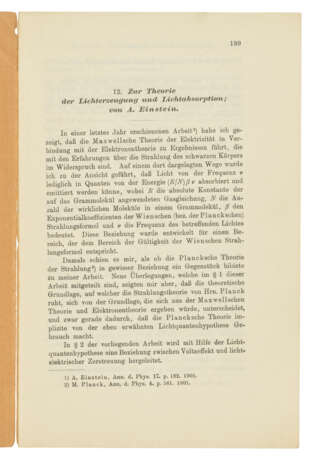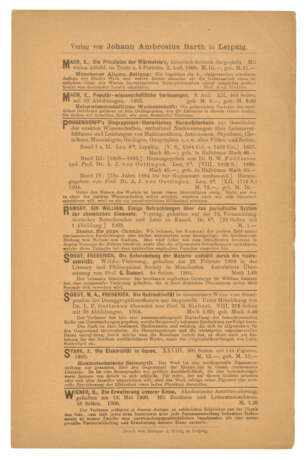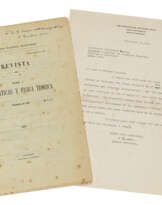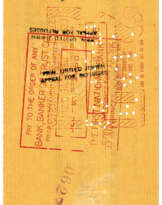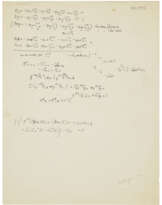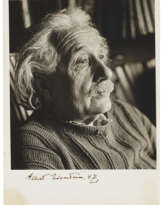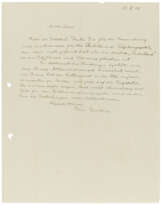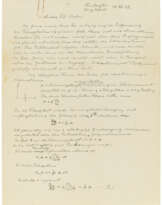ID 1349740
Lot 151 | EINSTEIN, Albert (1879-1955)
Estimate value
£ 70 000 – 100 000
‘Über einen die Erzeugung und Verwandlung des Lichtes betreffenden heuristischen Gesichtspunkt’. Offprint from: Annalen der Physik, 4th Series, vol. 17. Leipzig: Johann Ambrosius Barth, 1905. [Sold with:] – ‘Zur Theorie der Lichterzeugung und Lichtabsorption’. Offprint from: Annalen der Physik, 4th Series, vol. 20. Leipzig: Johann Ambrosius Barth, 1906.
Exceptionally rare first edition, author's offprint issues, of Einstein’s Nobel Prize-winning papers, from the library of pioneering theoretical physicist Arnold Sommerfeld (1868-1951).
These papers, in which Einstein proposes that light is a collection of independent particles of energy, or light quanta, were his ‘only contribution that he himself called revolutionary’ (Pais). ‘Such a hypothesis’, argued Einstein, ‘would provide an answer to the problem of black-body radiation where classical theories had failed, and would also explain several puzzling properties of fluorescence, photoionization and the photoelectric effect’ (Norman). A moment of foundational importance for modern physics, and a key element in the quantum revolution with important implications for the formulation of the theory of relativity, the 1905 paper was the first of four major papers published by Einstein in his Annus Mirabilis. The first English translation appeared a full 60 years after its original publication.
Arnold Sommerfeld was a German theoretical physicist who made significant contributions to atomic and quantum physics. He extended Niels Bohr's atomic model by introducing elliptical orbits for electrons and proposed additional quantum numbers, including the azimuthal and magnetic quantum numbers. Sommerfeld also introduced the fine-structure constant, contributed to X-ray wave theory, and co-discovered the Sommerfeld-Wilson quantization rules. His seminal work Atombau und Spektrallinien became a foundational text for the new generation of physicists developing atomic and quantum physics. Sommerfeld was an exceptional educator, mentoring 7 Nobel Prize winners and numerous other prominent physicists. Despite being nominated for the Nobel Prize a record 84 times, he never received the award. Nevertheless, he was honoured with several prestigious accolades, including the Lorentz Medal, the Max-Planck Medal, and the Oersted Medal, and was elected to numerous scientific academies worldwide. In 1918, Sommerfeld succeeded Einstein as chair of the Deutsche Physikalische Gesellschaft, and in 1922 Einstein wrote to his successor: ‘What I especially admire about you is that you have, as it were, pounded out of the soil such a large number of young talents’ A. Pais, ‘Subtle is the Lord...’: The Science and Life of Albert Einstein (1982).
These author's offprints can be distinguished from the normal 'trade' edition by the statement 'Überreicht vom Verfasser' on the wrappers. Extremely rare; we have only able to trace one copy of Über einen appearing at auction back in 1968 (RBH/ABSAA). BRL 7 & 12; Weil *6 & *12.
Together two volumes, octavo (222 x 142mm). Über einen: paginated 132-148. Original printed wrappers (small loss at spine ends and two corners, 40mm split at foot of spine, tiny nick at top edge of upper wrapper, pencil underlining and numbering to upper wrapper). Zur Theorie: paginated 199-206. Original printed wrappers (some splitting to spine, small nick at top edge of upper wrapper). Provenance: Arnold Sommerfeld (1868-1951; ownership inscription on upper wrappers, some pencil annotations in Über einen, red chinagraph underlining and numbering to upper wrappers).
| Artist: | Albert Einstein (1879 - 1955) |
|---|---|
| Place of origin: | Western Europe, Germany, Europe |
| Auction house category: | Books and manuscripts, Printed books |
| Artist: | Albert Einstein (1879 - 1955) |
|---|---|
| Place of origin: | Western Europe, Germany, Europe |
| Auction house category: | Books and manuscripts, Printed books |
| Address of auction |
CHRISTIE'S 8 King Street, St. James's SW1Y 6QT London United Kingdom | |
|---|---|---|
| Preview |
| |
| Phone | +44 (0)20 7839 9060 | |
| Buyer Premium | see on Website | |
| Conditions of purchase | Conditions of purchase |
